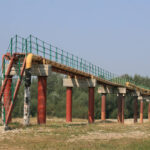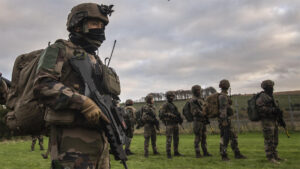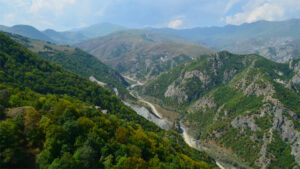Since the collapse of the Soviet Union, Armenia and Azerbaijan have been in conflict. But the tides are shifting in favor of Azerbaijan, thanks to several things.
Azerbaijan was able to retake all Armenian-occupied territory, including Nagorno-Karabakh, through the help of Turkey, some energy wealth, and drones. And it didn’t help that the Armenians lost their key security guarantor, the Russians. The peace deal on the table shows that Armenia is backed into a corner, and they know it.
Should the “Trump Corridor” happen, it’s going to be anything but peaceful. Iran and Russia will resist. The US would be taking on huge risks. And the Caucasus are going to face another bout of instability.
Transcript
Hey all, Peter Zeihan here coming from Colorado. And today we’re going to talk about the new deal between Armenia and Azerbaijan in the Caucasus. Now these are two small states and a part of the world that the United States tends to ignore, unless it’s looking at the bigger picture. So we’re going to start at the small and work our way to the big, and then talk about where we are.
So first of all, Armenia and Azerbaijan are two countries that have been in a de facto state of war, really since the post-Soviet break out. We had our first major war back, even before the Soviet Union collapsed in 1989 to 1991, where the Armenians invaded and sponsored a rebellion in an area called and broke that zone away from.
As Bhajan captured about a fifth of Azerbaijani territory on top of that, and basically maintained it as a semi-independent freedom that got most of its orders from the Armenian capital of year of UN. Ever since, the reason that the Armenians were able to do this, even though they had a smaller economy and half the population, is that the Russians played a role, basically backing the Armenians against the Azerbaijan.
The Russians saw Armenia as a strategic foothold in the region that would allow them to retain the possibility of reasserting control over the entire region just north of Armenia as a country called Georgia, which has been mostly in the pro-Western camp, or at least until recently, and the Russians have hated that as a region, has energy and was able to attract foreign investment, a way that the Russians never could.
And the Russians hated that. So maintaining a military base in Armenia was seen as the best, cheapest way to maintain influence. And it worked for them for 30 years. What has evolved in more recent times is as Azerbaijan has increased its energy output. Azerbaijan’s defense budget is now more than total Armenian GDP, so it was only a matter of time before the balance of power flipped.
And with the onset of drone technology, the Azerbaijanis were basically able to defeat the Armenians in a brief series of wars over the last few years and basically purged Armenian troops from the entirety of their occupied territory, including all of Nagorno-Karabakh. And now the region has control. All of it. Again, the nature of the dispute between the two basically runs the gamut.
It’s ethnic, with the Armenians being a more Western oriented mountain people, whereas the Azerbaijanis are more Turkic. It’s religious. The Armenians are a distinct branch of Christianity, while the Azerbaijanis are Shia muslims and it is cultural going back centuries. The Armenians are a relatively old people who have been in and around the area for well over millennia, and the Azerbaijanis are derivation of Turks.
So, you know, going back to a very long time. Okay, that’s the short version, the bigger version, the version that matters more to Americans is the broader power play in this region. The reason the Armenians are agreeing to a peace deal with Azerbaijan is because the Russians really aren’t present in the way that they used to be, just as the Russians used the Armenians, the Armenians were using the Russians.
The Armenians knew that in a straight up fight, there is no way that they could win against Azerbaijan, and Azerbaijan has stronger allies in the region, most notably Turkey. If it came to a real war in the way we might think about that in a broader scale.
Well, with the Ukraine war, the Russians are completely occupied further to the west, in the north. And that was before the Russians started pulling troops out of their military base in Armenia, because they needed everything they could get. So the Armenians realized that the Russian backing was going away. And when the Azerbaijanis launched the last couple of wars, the Ukraine war was already going on. And so the Russians could not intervene on the Armenians behalf.
And if your security guarantor is no longer guaranteeing your security, it’s time to find another deal, even if that deal ultimately has to be with Turkey, which is the country that carried out the Armenian Genocide back in the early days of the 20th century. So the Armenians are kind of on the ropes about their only other strategic assistance would have been Iran, which serves as a smuggling location and energy supplier.
But Iran, as you may have noticed over the last couple of years, has lost all of its leverage throughout the Middle East and Armenia. As a country, it has to subsidize. It doesn’t really get much. It’s just to kind of maintain a wedge in the area. So this allowed the Azerbaijanis and the Turks to lobby the Trump administration to get involved.
And that’s where the peace agreement came from. So this last Friday, the Azerbaijanis in the Armenian signed it. Does that mean we’re going to have peace? Well, let’s not get ahead of ourselves here. These two countries have a very, very long history. These two ethnicities have a long history of trying to kill each other whenever they have the opportunity.
And the only reason that Armenia is making these kind of gestures and making these statements is because they fear that they don’t have any other options. And that way may well be an accurate assessment of the situation. But I have some very real concerns, because of the way the geography works, see, Azerbaijan is on the far eastern side of the Caucasian isthmus to the north.
It has Russia, to the south it has Iran. If you go to the west, you hit Armenia. There is no land corridor that links Azerbaijan on to Turkey and the rest of the West. So if Azerbaijan is going to be a viable state long term, it has to build that corridor. And in building that corridor, you’re basically amputating part of southern Armenia so that Armenia is locked off from any potential allies.
Let me say this very clearly, a successfully integrated Azerbaijan means a dead Armenia, and the Armenians know that. So part of the terms of this new deal as we get something that is literally called the Trump corridor. Oh my God, that will be American sponsored and funded by who knows who that links a chunk of southern Azerbaijan through southern Armenia into Turkish territory.
And this is a corridor where Trump Corridor, if you prefer, is supposed to be a wellspring of investment. It will not be, there will not be a new oil pipeline because there already is one going north through Georgia that has never really been full. Azerbaijan’s oil production isn’t large enough. The Iranians will have a vested interest in breaking this thing to maintain their wedge in the Caucasus.
And the Russians are beyond pissed. So there be working against this, too. And then the bottom line here is that if this is successful, this corridor actually happens. Armenia is dead as a state. So they can’t let this happen anyway, never forget the first law of the caucuses. Never, ever, ever name anything after yourself because it’s not going to last.
Even Stalin, who is from this region, did not make that mistake. Why is Trump doing this? Well, I got talked into it by the Turks. If it works, brilliant. But there’s not an economic case here. Armenia is a country of less than 4 million people. Azerbaijan already has the international links it needs for economic reasons. This is a strategic ploy by Azerbaijan and Turkey.
And if, if, if it is going to succeed, the only way it happens is foreign troops are stationed on it to protect it. The Turks aren’t going to do that. The Azerbaijanis aren’t going to do that unless they get control of the territory. That just leaves the Americans. And the idea of putting ten, 20,000 American troops in a landlocked chunk of territory, surrounded by hostile powers with no supply lines.
That’s how you lose 10 or 20,000 troops. So don’t do that.








